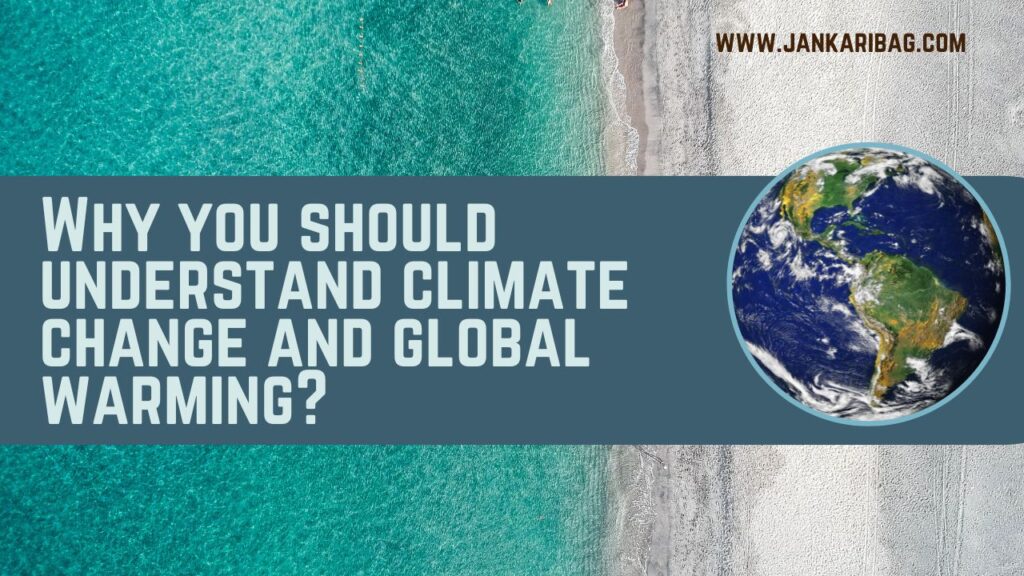Climate change and global warming are topics that are more important than ever. They impact every aspect of our lives, from the air we breathe to food.
In this blog post, we will explore what climate change and global warming are and their causes and effects, as well as provide practical ways to tackle these issues.
What is Global Warming and Climate Change?
Climate change refers to long-term shifts in temperature, precipitation, and other atmospheric conditions on Earth. Natural processes can cause this, but in recent years, human activities have been the primary driver of rapid climate change.
Global warming is a part of climate change. It specifically refers to the increase in Earth’s average surface temperature due to higher levels of greenhouse gases like carbon dioxide (CO₂) and methane (CH₄) in the atmosphere.
What are the Causes of Global Warming?
- Burning Fossil Fuels: The combustion of coal, oil, and gas for energy is a major source of carbon dioxide (CO₂) emissions, significantly contributing to global warming.
- Deforestation: The removal of forests reduces the Earth’s capacity to absorb CO₂, leading to higher concentrations of this greenhouse gas in the atmosphere.
- Industrial Activities: Factories and other industrial processes release various greenhouse gases during production, further exacerbating global warming.
- Agricultural Practices: Farming, particularly livestock farming, generates methane, a potent greenhouse gas, while certain agricultural techniques emit nitrous oxide.
- Waste Management: The decomposition of organic waste in landfills and waste treatment facilities produces greenhouse gases.
- Transportation: The use of cars, trucks, and airplanes, which burn fossil fuels, contributes to increased CO₂ emissions.
- Energy Production: Power plants that rely on fossil fuels release substantial amounts of greenhouse gases into the atmosphere.
- Land Use Changes: Converting forests into urban areas or agricultural land can release the carbon stored in trees and soil.
- Chemical Use: Certain industrial chemicals, including some refrigerants, have a high potential for contributing to global warming.
- Overconsumption: Excessive consumption of resources leads to increased waste and higher greenhouse gas emissions through various stages of production and disposal.
What are the Effects of Climate Change?
Climate change has far-reaching effects on our planet. Here are some key impacts:
- Increasing Temperatures: Rising average temperatures contribute to more frequent and severe heatwaves.
- Melting Ice Caps: The warming of the planet is causing polar ice caps and glaciers to melt, which in turn raises sea levels.
- Intensified Weather Events: There is an increase in the frequency and severity of storms, hurricanes, and floods due to changing climate conditions.
- Ocean Acidification: Higher levels of carbon dioxide (CO₂) are causing the oceans to become more acidic, which adversely affects marine ecosystems.
- Decline in Biodiversity: Rapid environmental changes are making it difficult for many species to survive, leading to a loss of biodiversity.
- Ecosystem Disruptions: Variations in temperature and precipitation are altering habitats, affecting both plant and animal life.
- Impact on Agriculture: Changes in climate patterns can lead to reduced crop yields and jeopardize food security.
- Health Concerns: Elevated temperatures increase the risk of heat-related illnesses and can facilitate the spread of diseases.
- Water Shortages: Shifts in precipitation patterns are impacting the availability of fresh water resources.
- Economic Implications: The damage caused by extreme weather events and rising sea levels can result in substantial economic losses.
How to Reduce Climate Change: 10 Practical Ways.
- Utilize Renewable Energy: Transition to clean energy sources like solar, wind, or hydro power to reduce reliance on fossil fuels.
- Enhance Energy Efficiency: Opt for energy-efficient appliances and light bulbs to lower overall energy consumption.
- Conserve Water: Address leaks and minimize water usage to decrease the energy required for water heating.
- Embrace Sustainable Transportation: Choose public transportation, cycling, or walking over driving to reduce carbon emissions.
- Practice Reduce, Reuse, Recycle: Lower waste generation by reusing items and recycling materials.
- Support Environmental Initiatives: Invest in or back businesses and policies focused on sustainability.
- Plant Trees: Trees play a crucial role in absorbing CO₂ and offer various environmental benefits.
- Reduce Meat Consumption: Eating less meat can help decrease methane emissions produced by livestock.
- Raise Awareness: Educate others about climate change and motivate them to take action.
- Advocate for Policy Change: Support and promote policies and legislation that aim to reduce greenhouse gas emissions.
How to Stop Global Warming: 10 Effective Actions.
- Adopt Renewable Energy: Promote and utilize clean energy sources like solar, wind, and hydropower to reduce reliance on fossil fuels.
- Improve Energy Efficiency: Upgrade building insulation and employ energy-saving technologies to lower energy consumption.
- Lower Carbon Footprint: Make changes in your daily life to reduce personal greenhouse gas emissions.
- Promote Sustainable Farming: Support agricultural practices that minimize greenhouse gas emissions and environmental impact.
- Cut Down on Plastics: Reduce the use of single-use plastics to decrease pollution and environmental damage.
- Implement Smart Growth: Plan and design urban areas to minimize environmental impact and promote sustainability.
- Advocate for Carbon Pricing: Support policies that put a price on carbon emissions to incentivize reductions.
- Invest in Carbon Capture: Support technologies that capture and store carbon dioxide to mitigate its impact on the atmosphere.
- Engage in Climate Action: Participate in or support local and global initiatives aimed at addressing climate change.
- Back Conservation Efforts: Contribute to and get involved with organizations dedicated to environmental protection and conservation.
Climate change and global warming are pressing issues that affect everyone. By understanding their causes and effects, we can take meaningful steps to mitigate their impacts.
By adopting sustainable practices and supporting policies aimed at reducing greenhouse gas emissions, each of us can contribute to a healthier planet for future generations.
“Remember, every small action counts when it comes to tackling these global challenges. Let’s work together to make a difference!”
Thank you for visiting Jankaribag.com. We hope you find our content useful and enjoyable. If you have any questions or suggestions, feel free to contact us.







